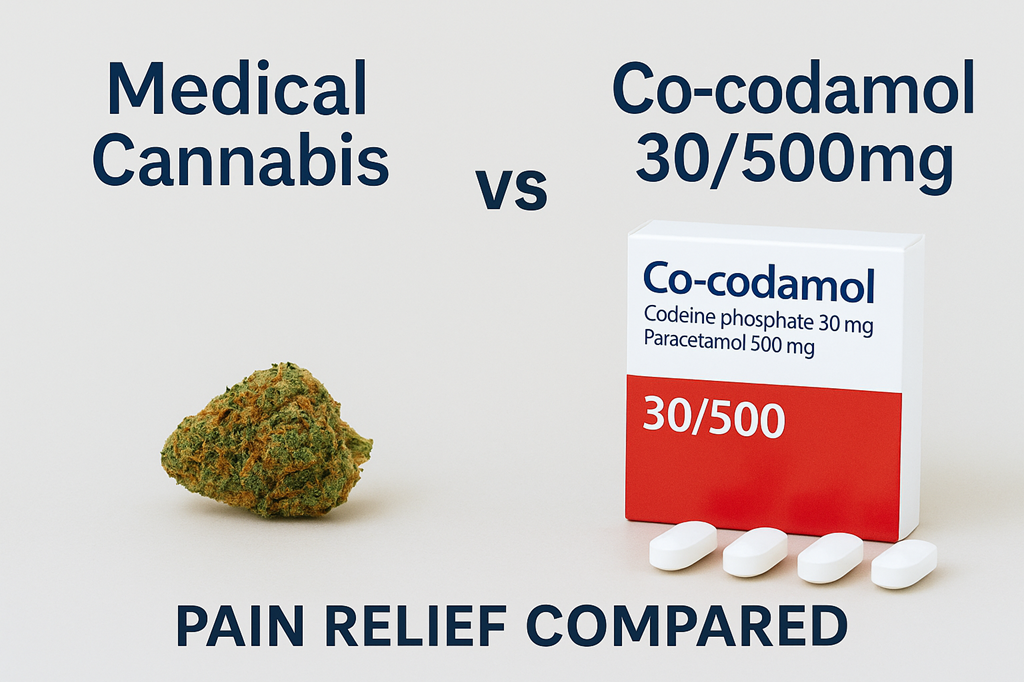Medical Cannabis vs Co-codamol 30/500mg: A Comparison for Pain Relief

When it comes to managing pain, patients in the UK are increasingly exploring different treatment options. Two of the most commonly discussed are medical cannabis and co-codamol 30/500mg (a prescription-only combination of codeine phosphate 30mg and paracetamol 500mg). While both can be effective, they offer distinct benefits depending on the nature of pain, individual health factors, and personal response.
Benefits of Co-codamol 30/500mg
Co-codamol is a long-established medicine in the UK, frequently prescribed for moderate to severe pain when other painkillers have not been effective.
1. Proven and reliable relief
- Fast-acting: The paracetamol component provides relatively quick pain relief, while codeine adds a longer-lasting effect.
- Trusted history: It has been prescribed for decades and is well-understood by GPs and pharmacists.
2. Dual action formula
- Paracetamol: Reduces pain signals and lowers fever.
- Codeine: An opioid that targets pain perception in the brain and spinal cord.
Together, this combination provides a strong analgesic effect compared to standard paracetamol or codeine alone.
3. Widely available under prescription
- Easily prescribed in the NHS setting for post-surgical pain, injury-related pain, or conditions like severe backache, arthritis, and migraines.
- Dosages can be adjusted by healthcare professionals to suit individual patient needs.
4. Versatility
- Suitable for short-term acute pain and sometimes for managing ongoing pain under medical supervision.
Benefits of medical cannabis
Medical cannabis was legalised in the UK for specialist prescription in 2018. It is not as widely prescribed as traditional medicines, but for certain patients, it offers unique advantages.
1. Multiple active compounds
- THC (Tetrahydrocannabinol): May help with neuropathic pain, muscle spasticity, and improving sleep.
- CBD (Cannabidiol): Known for anti-inflammatory, anti-anxiety, and analgesic effects without causing a “high”.
This dual action can make cannabis particularly beneficial for complex pain conditions.
2. Potential for chronic and neuropathic pain
- Patients with long-term pain that does not respond well to opioids or standard medication may find benefit in medical cannabis.
- Conditions such as fibromyalgia, multiple sclerosis, or neuropathic pain are areas where cannabis has shown promise.
3. Tailored prescriptions
- Medical cannabis can be prescribed in different forms: oils, capsules, and in some cases, dried flower for vaporisation.
- Clinicians can adjust THC:CBD ratios to fit patient requirements, offering a personalised approach.
4. Wider impact on quality of life
- Some patients report improvements in sleep quality, mood, and overall wellbeing, alongside pain relief.
- Because pain often comes with secondary issues such as insomnia and anxiety, this broader benefit can be significant.
Final thoughts
Both Co-codamol 30/500mg and medical cannabis play important roles in pain management, though they are very different in their action and application.
- Co-codamol: A dependable, fast-acting option for acute and moderate-to-severe pain, widely available on prescription.
- Medical cannabis: A more modern alternative that offers a tailored, holistic approach, particularly suited to complex or chronic pain conditions.
The right choice depends on the individual’s condition, medical history, and the advice of a qualified healthcare professional. In some cases, patients may even benefit from a combination of traditional painkillers and medical cannabis, carefully monitored by their prescribing doctor.


